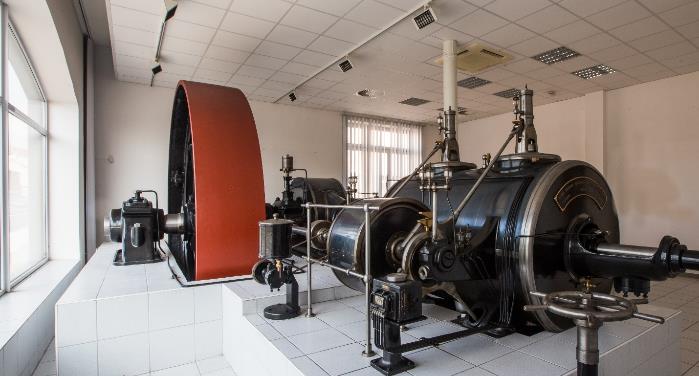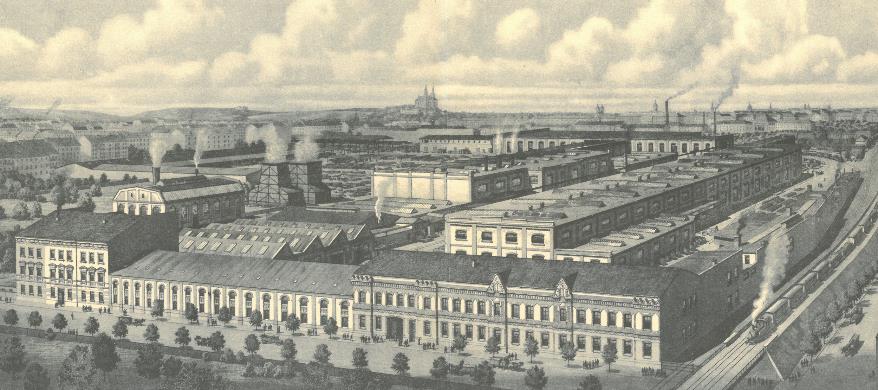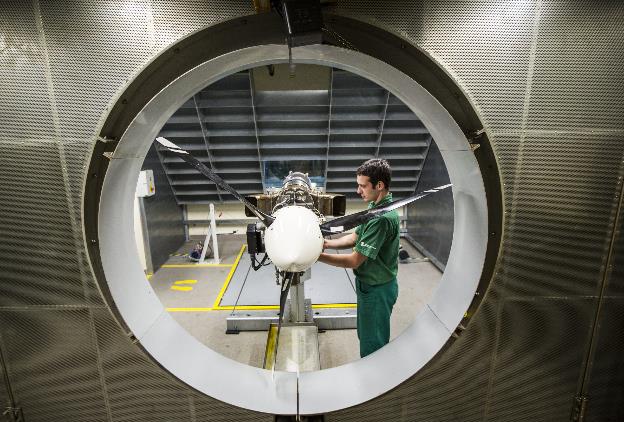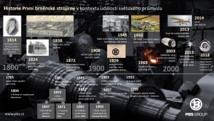One of the first engineering plants in continental Europe…
The engineering plant was established in 1814 by Johann Reiff. At first, he focused exclusively on the textile production. Soon after, however, that was struck by the crisis which put the company into significant trouble. But all the textile plants in the area were interested in exactly the kind of machines that Reiff was manufacturing. Which is why he stopped with the inefficient manufacturing of yarn and fully devoted himself to engineering. The main production programme slowly became the manufacturing of steam engines, boilers and turbines.
 Fig. Ten years after establishing the engineering plant it developed its own steam engine.
A model of it is on display at the Technical Museum in Brno. In the same year, the plant manufactured the first steam boiler.
Fig. Ten years after establishing the engineering plant it developed its own steam engine.
A model of it is on display at the Technical Museum in Brno. In the same year, the plant manufactured the first steam boiler.
PBS managed all of this before Siemens was eventually established in Berlin (1847), Asea – today’s ABB in Sweden (1883) or General Electric in New York (1892). Also at the time, Škoda in Pilsen wasn't in existence (1859) nor Prague’s ČKD (1871).
At the turn of the 19th and 20th century, a merger took place with another notable engineering plant in Brno - the Friedrich Wannieck & Co. foundry - which made První brněnská strojírna one of the largest industrial companies of Austria-Hungary. The company, commonly known as Vaňkovka, became one of the most significant subsidiary plants of PBS. Here they manufactured mostly steam turbines which were in such high demand that the engineering plant became their largest manufacturer in the whole of Czechoslovakia.
 Fig. Brno’s “Vaňkovka” in the year 1921
Fig. Brno’s “Vaňkovka” in the year 1921
Industry became the motor of the Austro-Hungarian Empire’s growth thanks to PBS
Industrial companies in the area of today’s Czech Republic were 60–90 per cent of the manufacturing industry in the Habsburg Empire in various fields, as stated by Petr Prokš from the historical institute of the Academy of Sciences of the Czech Republic. Historically, the Czech Lands have been among the most industrially developed regions across continental Europe.
At the turn of the century, PBS was the largest Austrian manufacturer of steam boilers and steam engines. Later it became the largest manufacturer of steam turbines. It supplied its products mainly for the food, chemical and power engineering industries. For the manufacturing of certain products, for example, the Parsons turbines, the company purchased a license. Soon after, however, for example in the case of the turbines – PBS came up with its own solution that allowed an increase of power and efficiency.
“Since the dawn of its existence, the engineering plant had a unique capital. And this capital were the talented and enthusiastic people who worked there. They managed to link a good business plan with a unique technological solution and then improve it from the point of view of quality, reliability and even performance parameters,“ says Miloslav Kafka, the Managing Director of PBS GROUP, a.s.
Czechoslovakia was one of the most advanced industrial countries
A developed industrial core was an important part of the country’s economy. The newly established Czechoslovakia following the end of the First World War was able to quickly develop and grow mainly thanks to its well-setup economy in which industrial production and engineering played an important role. In the 1920’s, Czechoslovakia was the ninth most advanced industrial country in the world according to Professor Richard Hindls from the University of Economics, Prague. The products of PBS found their use not only in the domestic market but with its quality and reliability they were praised by many foreign customers as well.
During the Second World War, PBS maintained its traditional range of products and it continued with this as a national company. The basis of the production programme were multi-stage turbines which found a use, among other places, in the construction of the transit gas pipeline. The company supplied industrial boilers to the domestic market but they were also among the most important export articles. The new plant built on a green field in Velká Bíteš in 1950 firstly focused on the manufacturing of valves and superchargers but it slowly and profoundly extended its products to other unique engineering products.
A successful entrée to the aviation industry
In the 1970’s the factory entered the aviation field where it developed and started to manufacture an auxiliary power unit (APU) for the Aero L-39 Albatros aircraft. Moreover, several types of devices, including the starter-generator add L-39 NG aircraft which Aero Vodochody officially introduced in September of this year.
“Today, the development, testing and manufacturing of equipment for the aviation industry represents the most significant part of our production. We started with auxiliary power units and air conditioning systems for aircraft and helicopters and later we added turbo, turboprop and turboshaft engines of our own design. Besides our own development and test labs, we have a wide production background with an engineering plant and a foundry that provide us with self-sufficiency,“ explains M. Kafka. This year, the company was even able to introduce two new turbo engines just months apart.
 Fig. Testing the TJ 1P100 turbo-prop engine in the test laboratory at the aviation division of PBS
Present PBS
Fig. Testing the TJ 1P100 turbo-prop engine in the test laboratory at the aviation division of PBS
Present PBS
Today, PBS GROUP, a.s. is comprised of three production companies: PBS Velká Bíteš a.s. manufactures mainly high-speed turbine machines for the aviation, power engineering or transport industry and it is also a specialist in the field of precision casting and precise engineering. PBS Energo, a.s. mainly focuses on the development, production, supply and service of steam and expansion turbines. PBS Brno (První brněnská strojírna, a.s.) acts as a complex supplier of power engineering equipment with a focus on industrial boilers. The whole group employs approximately 800 people and it exports more than 75 per cent of its production to the entire world.
“We’re proud that we can continue with such a rich and successful history and we’re especially pleased with the fact that our company continues in honouring traditional values which were connected with its name from its very beginning. Even today it is our employees who are developing the company, bringing new ideas and innovations that are helping us increase the quality and parameters of our production but they are also taking into account the current needs and individual expectations of our customers," adds M. Kafka.
About PBS GROUP, a.s.
The PBS GROUP governs one of the longest-standing engineering brands on the world market – První brněnská strojírna. It has been a synonym for innovation and quality for more than 200 years. You can find more information on our website at www.pbs.cz.
KE STAŽENÍ:

You can download the press release
here

infographics to download in
pdf format.